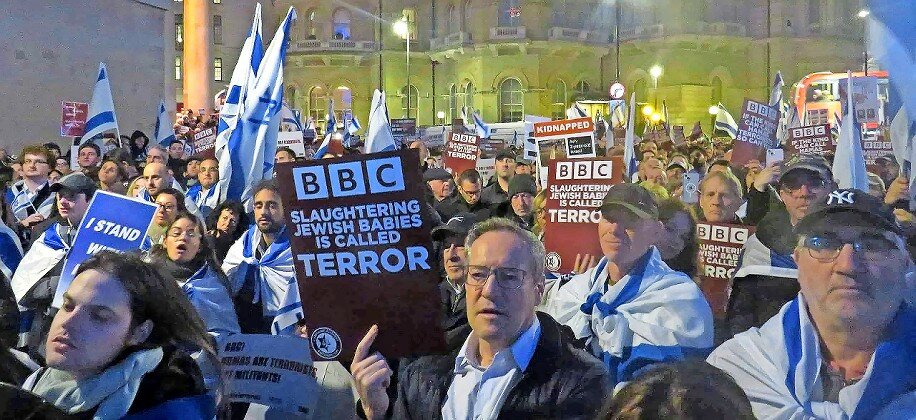Jew-hating BBC breached guidelines 1,553 times
BBC violated its own editorial guidelines 1,553 times during the four-months beginning Oct. 7, repeatedly downplaying Hamas terrorism and presenting Israel as an aggressor, according to an analysis released over the weekend.
“The findings reveal a deeply worrying pattern of bias and multiple breaches by the BBC of its own editorial guidelines on impartiality, fairness and establishing the truth,” the report said, according to the Telegraph newspaper.
British lawyer Trevor Asserson, who runs Israel’s largest international law firm and has long campaigned against BBC bias, led the research which found that BBC journalists repeatedly downplayed Hamas terrorism while presenting Israel as militaristic and aggressive.
Some BCC journalists who covered the current Israel-Hamas war previously showed sympathy for Hamas and even celebrated its terrorism, the report said.
Jeremy Bowen, the BBC’s international editor, excused Hamas’ terrorist acts and Lyse Doucet, the BBC’s chief international correspondent, downplayed the Oct. 7 attacks on Israel, it said.
The report censured especially the public broadcaster’s BBC Arabic channel, calling it one of the most biased of all international media in its coverage of the Gaza war.
It noted 11 cases in which BBC Arabic featured reporters who have previously made public statements in support of terrorism and specifically Hamas, without letting viewers know.
Danny Cohen, a former BBC executive, said that there was an “institutional crisis” at the national broadcaster. He called for an independent inquiry into its Gaza war coverage.
Asserson was joined by a team of about 20 lawyers and 20 data scientists, with artificial intelligence used to analyze nine million words of BBC output. Last week, he launched an organization called Campaign for Media Standards, to expose bias across UK media.
The Campaign Against Antisemitism and the National Jewish Assembly also called for an independent review, the Telegraph said.
Sir Oliver Dowden, shadow deputy prime minister, said, “The BBC is one of the premier news services in the world, and to hear that standards may be slipping in such a severe way like this, risks tarnishing the reputation of our news service.
“Serious questions should be asked as to why this has been allowed to happen, and license-fee payers should expect to see the BBC stick to its own editorial guidelines,” he said.
Following the Oct. 7 massacre, the BBC was condemned for failing to call Hamas members “terrorists.” In late Oct., the BBC said it would describe Hamas “where possible” as a “proscribed terrorist organization.”
However, the report found that Hamas was described as a “proscribed,” “designated” or “recognized” terrorist organization just 409 times (3.2%) out of 12,459 mentions over the four-month period.
Greg Smith, a Conservative Party member serving as both transport and business minister in the shadow government, said, “We knew in the aftermath of October 7 that the BBC was struggling to call a terrorist a terrorist.
“There are now clear grounds for Ofcom [the Office of Communications] and the Department for Culture, Media and Sport to use every tool they have in their arsenal to bring about greater compliance with the rules around neutrality and fair coverage in the BBC charter,” he said.
The BBC said it would “carefully consider” the report, which has been submitted to its director general, chairman and other board members, but a BBC spokesman already criticized the research, saying the corporation had “serious questions” about its methodology.
A BBC spokesman also denied allegations against its staff: “We strongly reject the claims that our reporters ‘celebrated acts of terror’ and we strongly reject the attack on individual members of BBC staff, all of whom are working to the same editorial guidelines.”
Lord Ian Austin, a former Labour Party minister, accused the BBC of “high-handed arrogance” for its ongoing dismissal of criticisms regarding its impartiality.
Lord Stuart Polak, honorary president of the Conservative Friends of Israel, said, “There’s a clear pattern. Other broadcasters have also made errors, but the BBC keeps getting it wrong. It’s shameful, it’s wrong and what’s worse — the BBC knows it.”
Dudley said that after spending decades defending the BBC, he is now “convinced” that its coverage of the war “fails to meet the standards of impartiality and independence on which its public funding is based,” the Telegraph reported.







